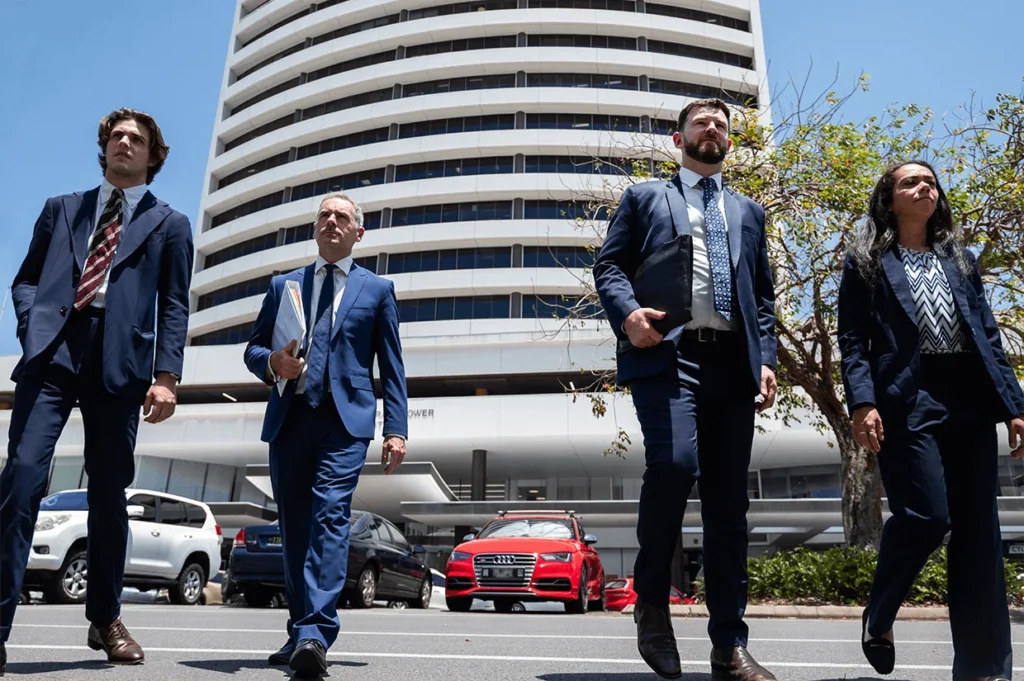Services
Arrest & Bail Lawyers Queensland

Arrest and Bail in Queensland: Your Rights and Options
Being arrested or charged with a crime is one of the most stressful moments anyone can face. Understanding how arrest and bail work under Queensland law (and knowing when to contact an experienced criminal defence lawyer) can make all the difference to your outcome.
At Osborne Butler, our Queensland bail lawyers have helped clients across Cairns, Brisbane and the Gold Coast navigate the legal system and secure their release quickly and effectively.
Call us if you're facing an arrest & bail charge
At Osborne Butler Lawyers, we’re experienced in defending all types of arrest and bail charges across Queensland. We have offices in central locations in Cairns, Brisbane and Gold Coast and attend court locations across QLD.
We understand how these cases are prosecuted and know how to challenge the evidence, negotiate with prosecutors and build the best defence.
Use the form to ask us anything. We’ll respond in 24 hours.
Arrest and Bail in Queensland: Your Rights and Options
Being arrested or charged with a crime is one of the most stressful moments anyone can face. Understanding how arrest and bail work under Queensland law (and knowing when to contact an experienced criminal defence lawyer) can make all the difference to your outcome.
At Osborne Butler, our Queensland bail lawyers have helped clients across Cairns, Brisbane and the Gold Coast navigate the legal system and secure their release quickly and effectively.
What is arrest and bail in Queensland?
In Queensland, the law sets out clear rules about when police can arrest someone and how bail works after a charge.
The main legislation covering arrest is the Police Powers and Responsibilities Act 2000. The main legislation covering bail in Queensland is the Bail Act 1980.
If you’ve been arrested or charged, understanding these laws can help you protect your rights and make informed decisions.
When can the police arrest someone in Queensland?
An arrest is when police lawfully take a person into custody because they reasonably suspect that person has committed an offence.
Police in Queensland can arrest you if they have a valid warrant for your arrest.
Without a warrant, police can arrest you if they reasonably suspect you’ve committed or are committing an offence and it’s reasonably necessary:
- to stop you from continuing to commit an offence
- to stop you from committing another offence
- to make sure you appear in court
- to prevent evidence from being lost
- to prevent interference with witnesses, or
- to ensure your safety or someone else’s safety.
Once arrested, the police must tell you that you’re under arrest and the reason for it. From that moment, you have certain legal rights.
What is bail and why is it important?
Bail allows someone charged with an offence to remain in the community while waiting for their court matter to be finalised. It recognises the legal principle that a person is presumed innocent until proven guilty in court.

How quickly can you get bail?
That depends on the type of bail.
- Police bail: Often within hours of arrest at the watchhouse
- Court bail: Usually at your first court appearance (typically within 24 to 48 hours of arrest if police refuse bail)
- Complex cases: May require a full bail application hearing, which can take several days to arrange
In Queensland, police can grant bail for most charges at the watchhouse. If police refuse to grant you bail, you will be brought before the Magistrates Court where you can apply for bail. For some serious offences that carry a maximum penalty of life imprisonment, only the Supreme Court can grant bail.
When deciding bail, police or courts assess whether there’s an “unacceptable risk” you will:
- Fail to appear in court
- Commit further offences
- Endanger the safety or welfare of victims, witnesses or the community
- Interfere with witnesses or evidence
For most offences, you have a legal right to apply for bail. However, if you’re in a ‘show cause’ situation (see below), you must prove why you shouldn’t remain in custody.
Types of bail arrangements in Queensland
The Bail Act 1980 (Qld) sets out several bail options:
1. Watchhouse or Police bail
Police can grant bail at the watchhouse shortly after charging someone. This means you can go home and return to court on a set date. The watchhouse may put conditions on your bail.
2. Court-ordered bail
If police refuse bail, your lawyer can apply for bail at your first court appearance. A magistrate or judge will decide whether you should be released and whether conditions should apply.
3. Bail with conditions
You may have specific conditions on your bail to reduce the risk of you committing offences or failing to appear in court. Common conditions include:
- Living at a specified address
- Reporting to a police station
- Avoiding contact with certain people or not going to a certain place
- Not consuming alcohol or drugs.
4. Surety or “Guarantor” bail
A surety is someone (usually a family member or close friend) who agrees to take responsibility for making sure you comply with your bail conditions.
How it works:
- Your surety signs a legal undertaking at court
- They promise to forfeit a specific amount of money if you breach bail (often $500 to $5,000 or more, depending on the seriousness of the charge)
- The surety doesn’t pay this money upfront, but they’re legally liable for it if you don’t comply
- Courts want to see that your surety is financially stable and has a genuine relationship with you.
Your lawyer can help find an appropriate surety and prepare them for what the court will ask.
What happens if you breach your bail conditions?
Courts take breaches of bail conditions very seriously. It is an offence to break any conditions of your bail. The maximum penalty for such an offence is 2 years imprisonment. If you break the terms of your bail, you could face immediate arrest and further charges.
Show cause: When bail is harder to get
There are some circumstances in which the presumption of bail is reversed, and the police or court must refuse to grant you bail unless you ‘show cause’ that your detention in custody is not justified.
You’ll be in a show cause situation if you:
- Commit an offence while already on bail or awaiting trial for another offence (except for simple offences like those punishable by fines only)
- Breach the Bail Act 1980 (for example, failing to appear in court or breaching a bail condition)
- Commit an offence while armed with a weapon (including a firearm or explosive)
- Commit an offence that carries a maximum penalty of life imprisonment
- Commit certain offences relating to organised crime
- Commit any domestic violence offence that includes the use, threatened use or attempted use of violence, or
- If you have already been convicted of a domestic violence offence within the past 2 years.
This is a much higher legal threshold. If you’re in a show cause situation, you need an experienced criminal defence lawyer immediately to build your bail application.
Domestic violence and bail
If you’re charged with a domestic violence offence in Queensland, bail conditions are often strict and may include:
- No contact conditions with the alleged victim
- Exclusion from your own home
- GPS monitoring in some cases
- Mandatory intervention programs
Courts take DV matters seriously. If you have a history of breaching domestic violence orders, bail may be refused or granted only with stringent conditions.
Important: Even if you and the complainant want contact, breaching a no-contact condition can lead to immediate arrest and new charges.
Understanding your rights during arrest
If you’re arrested in Queensland, you still have important legal rights. Understanding what they are could help you defend your charges in court. For instance, you have the right to:
- Remain silent (other than stating your name, address and date of birth)
- Contact a lawyer before answering any police questions
- Contact a friend or relative to tell them where you are
- Be informed of the reason for your arrest
- Be treated humanely and without unnecessary force
It’s crucial that you raise your entitlement to these rights – and exercise them – as early as possible after your arrest.
Never take police questioning lightly – anything you say can be used in evidence against you.
So before you speak, always ask to call a criminal defence lawyer.
What should you do if you’re arrested or need bail?
If you’ve been arrested or charged with an offence:
- Stay calm. Cooperate with police but don’t volunteer extra information.
- Ask to contact a lawyer immediately. A criminal law specialist from Osborne Butler or another criminal defence lawyer can speak with police on your behalf and begin arranging bail.
- Don’t sign or agree to anything. Make sure you receive legal advice before you agree to anything and don’t sign any documents without your lawyer’s consent.
- Provide your lawyer with the full details. Acting quickly gives your legal team the best chance to secure release and protect your rights.
Remember: early legal advice often means the difference between staying in custody and going home.
When should you contact a criminal defence lawyer?
You should get in touch with a lawyer as soon as:
- You’re arrested or believe police intend to arrest you
- Bail has been refused or you’re applying for bail in court
- You’re charged with breaching bail or want bail conditions changed, or
- Police have asked you to attend an interview or make a statement
Call Osborne Butler Lawyers for immediate help
Your liberty is too important to leave to chance.
If you or someone you know has been arrested or needs help with bail, contact Osborne Butler Lawyers immediately.
Our experienced criminal defence team will:
- Explain your rights in clear terms
- Represent you in court
- Work to secure your release on bail or have unfair conditions removed
[CTA] If you or someone you care about has been arrested in Queensland, contact Osborne Butler Lawyers immediately for expert legal advice and defence.
Frequently asked questions about Bail in Queensland
Can I get bail for any offence?
Not always. In many situations, the burden shifts to the accused to show why bail should be granted. In most circumstances, you’re entitled to apply for bail. To assess whether you are at an unacceptable risk’ of committing further offences or breaching your bail conditions, the court will look several factors including:
- your criminal history
- any previous grants of bail
- the nature and seriousness of the offence
- your personal circumstances.
How long does bail last?
Bail usually remains in force until your case is finalised, unless it’s revoked or varied by the court.
What happens if I breach bail?
Breaching bail can lead to arrest, new charges and a much lower chance of being granted bail again. Always speak to your lawyer before making any change that could affect your conditions.
Can police refuse bail?
Yes. If police believe you might re-offend, avoid court or interfere with witnesses, they can refuse bail. Your lawyer can then apply to the court for release.
What if I'm charged with a domestic violence offence?
DV bail conditions are typically strict and may prevent you from returning home or contacting family members. Our lawyers can apply for condition variations if circumstances change or argue for less restrictive conditions at your initial hearing.
How We Can Help You
40+ Years Combined Experience
When you engage Osborne Butler, your matter will be handled by experienced lawyers who will be by side every step of the way.
Available 24/7
The earlier you have a lawyer on your side, the better chance you have of achieving a favourable outcome.
We Fight For Your Future
Our promise goes beyond words. We're in your corner, championing your rights and fighting fiercely for your future.
Fixed Price Costing
We offer our clients the option of a fixed price for our services ensuring transparency and no surprises.
Our Commitment To You
We treat our clients with empathy and respect. We’re dedicated to breaking down legal jargon and the complexities of the criminal justice process.
Your Privacy Is Our Priority
You can be assured of our strict confidentiality and sensitivity policy no matter how big or small the charge.
If you or someone you care about is facing an arrest & bail charge in Queensland, contact Osborne Butler Lawyers immediately for expert legal advice and defence.
Need a Criminal Defence Lawyer? Contact Osborne Butler
If you have a question or require legal advice or representation, please complete this form and we’ll respond within 24 hours. For urgent matters, please call us:
Cairns: 07 4041 3301
Brisbane: 07 3521 5588
Gold Coast: 07 5532 0066

